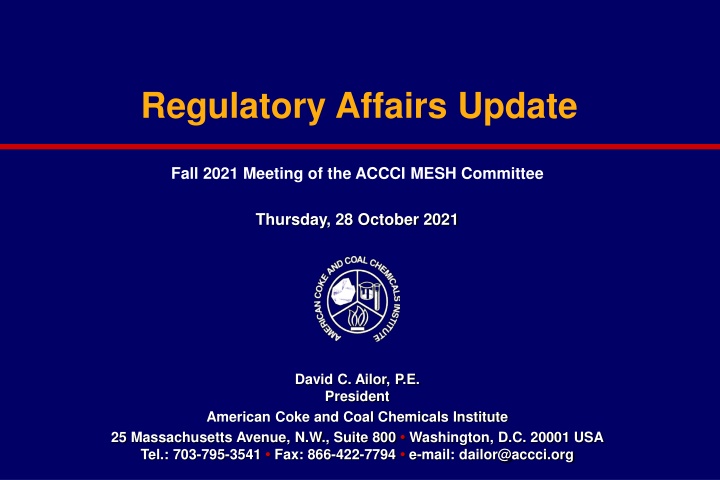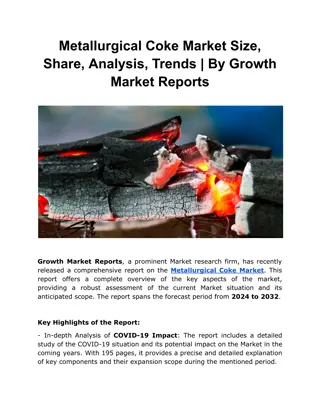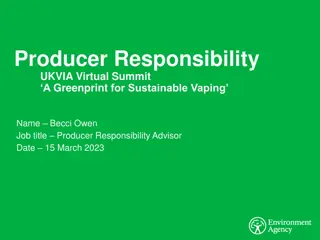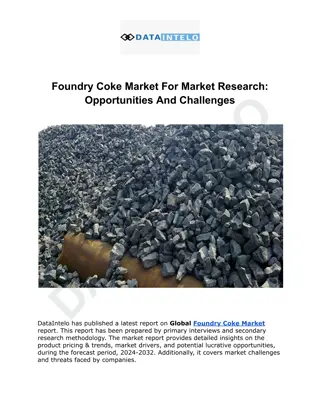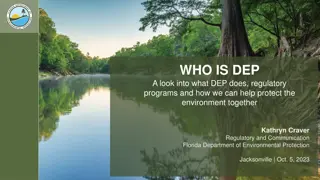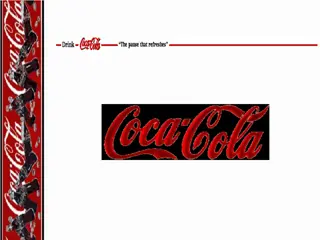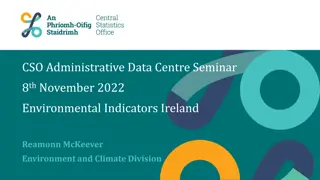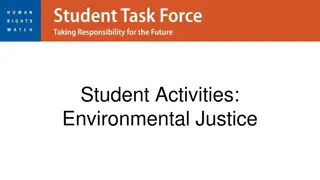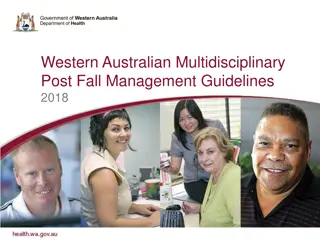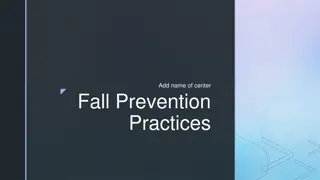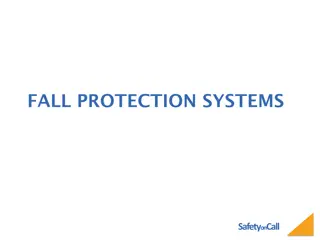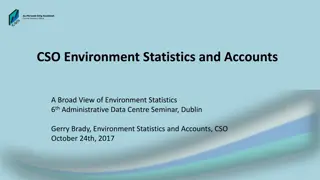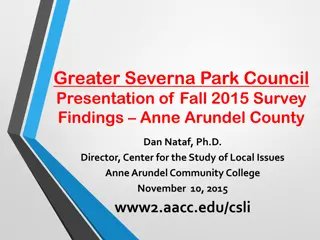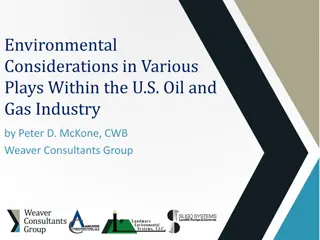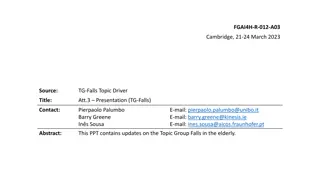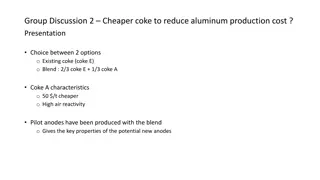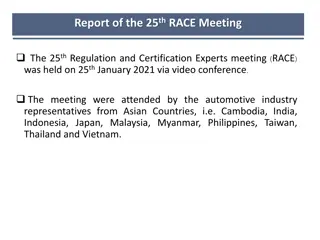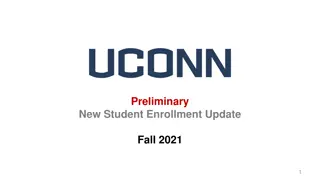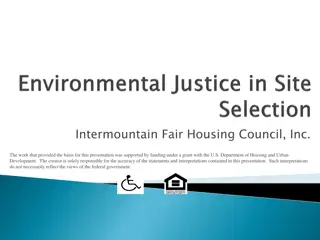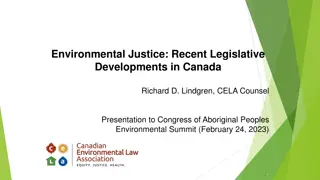Update on U.S. Coke Industry and Environmental Regulations Fall 2021
The Fall 2021 meeting of the ACCCI MESH Committee discussed the current status of the U.S. Coke Industry, key environmental issues facing the industry, and the role of the COETF in addressing sector-specific concerns. Topics included EPA's Risk and Technology Review of 2003 MACT standards for coke, CAA regulations, and industry litigation. The COETF, formed in 1996, collaboratively addresses major environmental challenges, with a focus on by-product recovery plants and heat recovery coke plants in the U.S.
Download Presentation

Please find below an Image/Link to download the presentation.
The content on the website is provided AS IS for your information and personal use only. It may not be sold, licensed, or shared on other websites without obtaining consent from the author.If you encounter any issues during the download, it is possible that the publisher has removed the file from their server.
You are allowed to download the files provided on this website for personal or commercial use, subject to the condition that they are used lawfully. All files are the property of their respective owners.
The content on the website is provided AS IS for your information and personal use only. It may not be sold, licensed, or shared on other websites without obtaining consent from the author.
E N D
Presentation Transcript
Regulatory Affairs Update Fall 2021 Meeting of the ACCCI MESH Committee Thursday, 28 October 2021 David C. Ailor, P.E. President American Coke and Coal Chemicals Institute 25 Massachusetts Avenue, N.W., Suite 800 Washington, D.C. 20001 USA Tel.: 703-795-3541 Fax: 866-422-7794 e-mail: dailor@accci.org
PRESENTATION OVERVIEW Current Status of the U.S. Coke Industry Background on the ACCCI-Managed Coke Oven Environmental Task Force (COETF) Principal Sector-Specific Environmental Issues of Concern to the U.S. Coke Industry Principal General Industry Environmental Issues of Concern to the Coke Industry Principal Environmental Issues of Concern to the Coal Chemicals Industry 2 Other Important Issues
CURRENT STATUS OF THE U.S. COKE INDUSTRY 14 operating coke plants (47 batteries) 6 integrated steel by-product recovery plants (20 batteries) operated by 2 companies 3 merchant by-product recovery plants (7 batteries) operated by 3 companies 5 merchant heat-recovery plants (20 batteries) operated by 1 company ACCCI addresses key general industry regulatory issues facing the U.S. coke industry. ACCCI-managed Coke Oven Environmental Task Force (COETF) addresses key sector-specific environmental issues facing the U.S. by-product recovery coke industry. 3
BACKGROUND ON THE COETF The COETF was formed by the American Iron and Steel Institute (AISI) and ACCCI in 1996 to address major environmental issues collaboratively. The COETF operates as a semiautonomous, self-funded entity. The COETF represents 4 companies that operate 8 of the 9 by- product recovery plants in the U.S. (24 by-product recovery batteries). 6 integrated steel by-product recovery plants (20 batteries) operated by 2 companies 2 merchant by-product recovery plants (4 batteries) operated by 2 companies Five heat recovery coke plants (20 batteries) are not represented by/participating in the COETF. 4 Katie Kistler (Cleveland-Cliffs) is the chair of the COETF.
PRINCIPAL SECTOR-SPECIFIC ENVIRONMENTAL ISSUES OF CONCERN TO THE U.S. COKE INDUSTRY EPA s Risk and Technology Review (RTR) of 2003 MACT Standards for Coke PQBS CAA 112(c)(6) Litigation 112(d)(6) RTR Deadline Litigation 5
EPAS RISK AND TECHNOLOGY REVIEW (RTR) OF 2003 MACT STANDARDS FOR COKE PQBS On April 14, 2003, EPA promulgated maximum achievable control technology (MACT) standards for coke pushing, quenching and battery stacks (PQBS). Standards are to limit hazardous air pollutants (HAPs) from PQBS (e.g.,benzene, toluene, coke oven emissions ). Clean Air Act (CAA) requires EPA to determine within eight years of promulgation (i.e., by 2011 for PQBS) whether tighter standards should be issued, based on: risks to public health associated with MACT-level emissions (risk review); and, whether any improvements in control technology have occurred since the MACT standards were issued (technology review). EPA is behind schedule on the RTR for coke PQBS, having only kicked off the multi-year (typically, three-to-four year) RTR Review/Rulemaking in early 2015. EPA is now moving forward aggressively on the Review/Rulemaking. 6
LATEST DEVELOPMENTS ON THE PQBS RTR EPA is moving forward aggressively on the PQBS RTR Review/Rulemaking. EPA has developed a compiled modeling file for subpart CCCCC sources, that it will use shortly to project the residual risk associated with coke plant hazardous air pollutant (HAP) emissions. The COETF is ramping up its efforts to match those of EPA. 7
CAA 112(C)(6) LITIGATION CAA 112(c)(6) requires source categories responsible for at least 90% of the aggregate emissions of seven Persistent Bioaccumulative (PBA) Hazardous Air Pollutants (HAPs) to be subject to standards under CAA 112(d)(2) [MACT] or 112(d)(4) [risk-based for specified HAP]. One of the seven HAPs is associated with coke oven emissions (COE) - polycyclic organic matter (POM). 8 (continued)
CAA 112(C)(6) LITIGATION (continued) In June 2015, EPA issued a rule stating that it had satisfied 112(c)(6) by promulgating standards for numerous specified source categories, including the NESHAPs for coke oven charging/topside/doors, by-product recovery plants, and PQBS. ENGOs filed comments on the proposed rule that EPA had not satisfied its 112(c)(6) obligations with respect to POM from coke ovens because COE is not an appropriate surrogate for POM. ENGOs argued that EPA must promulgate new MACT standards for coke ovens specifically regulating POM. (continued) 9
CAA 112(C)(6) LITIGATION (continued) In July 2015, ENGOs challenged the 112(c)(6) determination (Sierra Club v. EPA). Sierra Club challenged EPA s June 2015 determination that it had met all 112(c)(6) requirements arguing, among other things, that COE is not an appropriate surrogate for POM. Sierra Club wants EPA to promulgate new MACT standards regulating POM for coke oven charging/topside/doors, by-product recovery plants, and PQBS. In June 2016, an industry coalition comprised of seven associations (ACCCI, ACA, ACC, AF&PA, AFPM, AISI and NACWA) filed an amicus brief in support of EPA, arguing: ENGO claims are time barred; ENGO claims were raised previously and not pursued; and, EPA developed an adequate factual basis for use of surrogates. 10 (continued)
CAA 112(C)(6) LITIGATION (Concluded) On July 18, 2017, the U.S. Court of Appeals for the D.C. Circuit remanded but did not vacate the completeness determination on procedural grounds, holding that EPA failed to respond to Sierra Club s rulemaking comments regarding the reasonableness of EPA s pollutant surrogacy claims. As a result of the court s decision, EPA must respond to the comments on the pollutant surrogate issue for each of the 17 source categories challenged in the case, including subparts L and CCCCC. Implications: It is unlikely that EPA will set new MACT standards for POM. EPA has flexibility to address the surrogate issue comments in upcoming RTR rulemakings (for PQBS and several of the other source categories) or in a consolidated response to comments for all 17 source categories. POM-COE surrogacy issue may come up in the PQBS RTR Review/Rulemaking. 11
CAA 112(D)(6) RTR DEADLINE LITIGATION CAA 112(d)(6) EPA must review and revise existing NESHAPs as necessary (taking into account developments in practices, processes, and control technologies) no less often than every 8 years. April 3, 2015 ENGOs filed lawsuit in D.D.C. (CCAT v. EPA) to set court-ordered deadlines to complete RTRs for 20 source categories PQBS not included February 24, 2016 ENGOs filed a second lawsuit in D.D.C. (Blue Ridge Env. Def. Fund v. McCarthy) for 13 more source categories PQBS RTR not included February 13, 2019 ENGOs submitted to EPA a Notice of Intent (NOI) to file a deadline suit for the PQBS RTR and that for coke oven doors, lids, offtakes and charging (Subpart L). April 15, 2019 - ENGOs filed a Clean Air Act citizen suit seeking to require EPA to revise emission standards, or determine they are not required, for the PQBS RTR and that for coke oven doors, lids, offtakes and charging (Subpart L). (continued) 12
CAA 112(D)(6) RTR DEADLINE LITIGATION (Concluded) On March 13 and 22, 2017, the District Court set the following schedules: December 31, 2018 Deadline to promulgate RTR for 7 source categories March 13, 2020 Deadline to promulgate RTR for 20 source categories June 30, 2020 Deadline to promulgate RTR for 6 source categories EPA will likely focus resources on these 33 RTRs, which may delay those not subject to court-ordered deadlines. Because PQBS RTR was not included in any of the two original deadline suits, the June 30, 2020, court- ordered deadline does not apply to the PQBS RTR. On June 26, 2020, a judge with the US District Court for the Northern District of California ruled in an ENGO Clean Air Act (CAA) 112 (D)(6) lawsuit concerning EPA s missed CAA deadlines for issuing the RTRs for PQBS. The judge ordered EPA to take final action on Coke Oven Batteries (technology review only) and PQBS (risk and technology reviews) within 30 months of June 26 i.e., by December 26, 2022. EPA appears on track to issue a proposal in February 2022. It s not known what the timing and status are for the 112(f)(2) Risk Review for LAER Track Batteries that EPA must conduct under Subpart L for coke oven doors, lids, offtakes and charging. That Review was to be completed by 2020. 13
PRINCIPAL GENERAL INDUSTRY ENVIRONMENTAL ISSUES OF CONCERN TO THE U.S. COKE INDUSTRY EPA s SSM Policies (via an SSM Coalition) EPA s Boiler MACT and CISWI Final Rules, and Related Litigation (via a Boiler Industry Coalition) EPA s Once-In/Always-In Policy Final Rule ENGO Lawsuit Alleging that USS Violated 42 U.S.C. 9603(a) of CERCLA (via a US Chamber of Commerce-led Multi-association Coalition) EPA s Greenhouse Gas Policies EPA s New Source Review (NSR) Reform Initiative EPA s PM/Ozone NAAQS Final Rules and the Implementation of Same (via a NAAQS Regulatory Review & Rulemaking Coalition (NR3C)) Federal and State Water Quality Rulemakings (via a Federal Water Quality Coalition (FWQC)) Federal and State PFAS Rulemakings (via a PFAS Regulatory Coalition) PEER Petition Regarding EPA s RCRA Corrosivity Characteristic (via an ad hoc coalition focused exclusively on this issue) 14
PRINCIPAL ENVIRONMENTAL ISSUES OF CONCERN TO THE COAL CHEMICALS INDUSTRY Litigation Over EPA s 2020 Final Multi-Sector General Permit (MSGP) State/local legislation that would ban use of coal tar- based sealants 15
LITIGATION OVER EPAS 2020 FINAL MULTI- SECTOR GENERAL PERMIT (MSGP) On June 16, 2015, EPA issued its 2015 MSGP for stormwater discharges from industrial sources. The MSGP is the collective term for the CWA National Pollutant Discharge Elimination System (NPDES) program's general permits for stormwater discharges from industrial facilities spanning 29 sectors, including, but not limited to, chemical manufacturing, textile mills, and timber products. EPA reissues the MSGP every five years. On August 16, 2016, EPA reached a settlement in Clean Water Act (CWA) lawsuits filed over the 2015 MSGP by several ENGOs. ACCCI was a party to the settlement discussions between the ENGOs, EPA and industry. Under a key provision in the settlement agreement, prior to reissuing the next MSGP in 2020, by November 20, 2019, EPA had to propose that industrial facilities using coal tar sealant (RTS) "to initially seal or to re-seal pavement and thereby discharge polycyclic aromatic hydrocarbons ('PAHs') in stormwater are not eligible for coverage under the MSGP and must either eliminate such discharges or apply for an individual permit. (continued) 16
SETTLEMENT AGREEMENT RESULTING FROM LITIGATION OVER EPA S 2015 MULTI-SECTOR GENERAL PERMIT (MSGP) (Concluded) On March 2, 2020, EPA published in the Federal Register the proposed 2020 Multi-Sector General Permit (MSGP) for stormwater from industrial activities. The Pavement Coatings Technology Council (PCTC) of which ACCCI is a member was the lead on a PCTC-COETF shared cost partnership engaging EPA on the coal tar sealant (RTS) eligibility provision as the Agency moved forward towards proposal. The comment period on the proposal closed on June 1, 2020, and the COETF and PCTC submitted joint comments on it that day, arguing against an RTS eligibility provision being included in it On January 15, 2021, EPA issued its final 2020 MSGP (see https://www.epa.gov/npdes/stormwater-discharges-industrial-activities-epas-2021-msgp). EPA decided NOT to include an RTS eligibility provision in the Final MSGP. The permit was effective on March 1, 2021, in states and other areas covered by the EPA permit itself; it replaces the 2015 MSGP, which expired on June 3, 2020. On July 1, 2021, an environmental group, the Center for Biological Diversity (CBD), filed a lawsuit challenging the Final MSGP in the U.S. Court of Appeals for the Ninth Circuit, in California; CBD did not indicate exactly what it is challenging. On July 30, 2021, counsel to a new partnership of the COETF and PCTC intervened in the lawsuit on behalf of COETF-PCTC. COETF-PCTC intervened in anticipation of CBD challenging EPA s decision not to include an RTS eligibility provision in the Final MSGP. 17
STATE/LOCALLEGISLATION THAT WOULD BAN USE OF COAL TAR-BASED SEALANTS Legislation that would ban use of coal tar-based sealants has been enacted or is being considered in various states/localities (e.g., MD, NY, MI, MN, IL, ME, Chicago). Legislation is being driven by USGS scientists and handful of environmental activists and media. The Pavement Coatings Technology Council (PCTC) of which ACCCI is a member is pushing back aggressively on proposed bans, adverse publicity. In late 2020, PCTC hired a new Executive Director, Brian Riggs, who took over management of the association in January 2021. 18
QUESTIONS? 19
